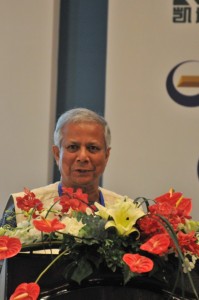It all started with Tom Heinemann’s documentary “Caught in Micro Debt [1]” which was aired on the 30th of November, 2010 on the Norwegian state Television. This had set off a chain of events which triggered much controversy on microcredit and Bangladeshi Nobel Laureate Dr. Muhammad Yunus [2] and resulted in the investigation of operations of Grameen Bank, which he founded.
 [3]
[3]Muhammad Yunus, global pioneer of microcredit and founder of the Grameen Bank. Image by Ken Davies. Copyright Demotix.
The fingers are pointing towards the government [6] as the earlier reaction of Bangladesh's Prime Minister Sheikh Hasina was a bit too harsh – as she mentioned “in the name of poverty alleviation he (Yunus) is sucking blood from the poor”.
Ireen Sultana at BDNews24 Blog [7] explains:
একজন সরকার প্রধানের মুখ থেকে এ ধরনের বক্তব্য সুষ্পষ্টভবাবে সরকারি অবস্থান এবং মনোভাবকে নির্দেশ করে। আর তাই যতই বলা হোক না কেন গ্রামীণ ব্যাংকের ব্যবস্থাপনা পরিচালক পদ থেকে ডঃ ইউনূসকে অব্যাহতি প্রদানের লিখিত নির্দেশ এসেছে বাংলাদেশ ব্যাংক থেকে, দেশি-বিদেশি প্রতিক্রিয়া ব্যক্তকারিরা এটাকে সরকারি সিদ্ধান্ত বলে মনে করছেন।
The popular belief is that Yunus is being seen as a political counterpart because of his failed attempt to join politics in 2007. Ireen Sultana asks:
একজন অ-রাজনৈতিক ব্যক্তিত্ব কি করে একটি রাজনৈতিক দলের প্রতিপক্ষ হয়ে উঠতে পারেন?
Philanthrocapitalism blog comments [8] in a post titled “leave Yunus alone”:
As Grameen points out, it is owned by its 8 million or so borrowers, most of them relatively poor women. It remains to be seen if the voice of these owners will be heard. There is a real danger that what is in effect an attempted takeover by the Bangladesh government will do serious damage to Grameen and the people it helps. While there are certainly examples of for-profit microlenders harming the poor, we think the greater harm to the poor is often done by the politicians who purport to be on their side.
Clearly the country has been divided on this issue. The opposition has been quick to back Yunus [9] saying that he has been victim of vengeance. Netizens are also divided. Bloggers like Ichcha Manab thinks [10] that this sudden decision to remove Yunus from the board is a disrespect to the Nobel Laureate and is a dent to the country's image. Columnist Shamsher Chowdhury at The Financial Express says [11]:
The lone Nobel laureate of Bangladesh should have been dealt with a little more dignity and respect. The entire saga clearly smells of jealousy, anger, vengeance and vendetta on the part of those who orchestrated the campaign against Prof Yunus. People at large are confused and would like to have a complete picture of what charges or irregularities Yunus is guilty of.
On the other hand Shafiur at Imperfect|World [12] says:
For decades his zillions of fawning supporters have twisted the truth and failed to see the limited creature that microcredit is. I hope today that grin has been wiped off his face. For sure he is fighting back and he has powerful friends both at home and abroad. But this is a day to savour.
Some like Mahbub Morshed [13] cannot understand what the fuss is all about as they think that Yunus's credibility and achievements will not be lost if he is no longer the MD of Grameen operations.
Himu writes [14]:
তিনি যদি এতই বিচক্ষণ আর বিবেচক হবেন, কেন এই প্রতিষ্ঠানটিকে স্বাভাবিক প্রশাসনিক প্রক্রিয়ায় যোগ্য কোনো পরিচালনা পর্ষদের কাছে হস্তান্তর করলেন না?
Alamgir concludes his post [15] at Sachalayatan with this:
দারিদ্র্যকে জাদুঘরে পাঠাতে চেয়েছিলেন ড. ইউনূস। সেটা হবার নয়। তবে দরিদ্র মানুষের ভাগ্যের কিছুটা পরিবর্তন নিশ্চয়ই করতে পেরেছেন; কতটুকু পেরেছেন সেটা ভবিষ্যৎ বিচার করবে। সরকার আইনের দোহাই দিয়ে একজন বুড়ো মানুষকে বিদায় দিচ্ছে। যে মন্ত্রী সেটা করছেন তিনি আরো বুড়ো কিন্তু মন্ত্রী হবার জন্য বয়স, শিক্ষা, যোগ্যতা কোন বিষয় নয়। প্রধানমন্ত্রীও তাঁর পূর্বপ্রতিশ্রুত অবসর গ্রহণের বয়স পার করেছেন। দেখা যাক কী হয়।
শেষ বিচারটা সবসময় জনগণই করবে। ড. ইউনূসের জন্য অনেক অনেক শুভ কামনা রইল।
The citizens will judge at last. Our best wishes to Dr. Yunus.